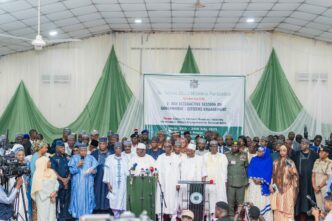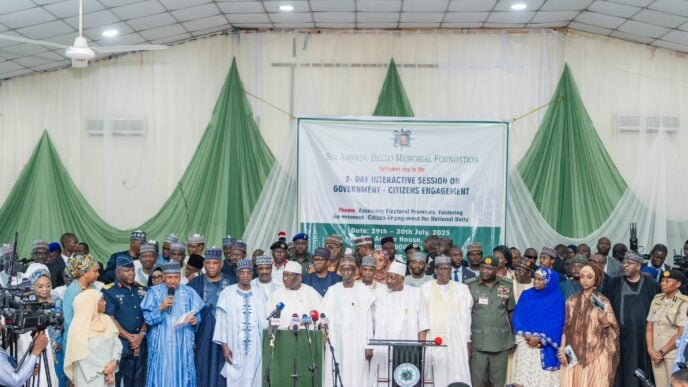BY CHIONYE HENCS ODIAKA
Kemi Badenoch, now leader of the Conservative Party and the UK’s opposition leader, embodies a modern British story. Born in London to Nigerian parents, educated and politically forged in Britain, with formative experiences that include time spent in Nigeria, her dual heritage is not a weakness but a profound asset. In a diverse, globally connected Britain, the most compelling leaders are those confident enough to carry every part of who they are into public life.
Yet recent remarks and signals from Badenoch have left many Nigerians both at home and in the diaspora feeling that she treats her Nigerian roots as a liability to be managed rather than a strength to be embraced. But the lesson here is simple and timeless. You do not need to diminish your heritage to rise or win elections. In fact, authenticity is political capital. When you affirm your roots, you earn trust from communities at home and abroad. When you disown them, you risk sounding insecure about the very identity that could distinguish your leadership.
Consider the example of Ashleigh Plumptre, the English born footballer of Nigerian heritage who is even more distantly connected to Nigeria than Badenoch. Her link to the country comes through her paternal grandfather. Yet she chose to represent Nigeria and, in doing so, became a powerful symbol of connection between the diaspora and the homeland. She obtained a Nigerian passport through that lineage, gained FIFA approval, and has since become a source of pride for Nigerians worldwide.
Advertisement
Her journey is a clear reminder that identity can be expansive and additive. You can be fully British and proudly Nigerian without contradiction.
That message became even more poignant this past week. On July 29, 2025, Nigeria’s Super Falcons won the Women’s Africa Cup of Nations, securing their record extending tenth title in a dramatic 3–2 final against hosts Morocco. Diaspora rooted players like Plumptre featured prominently in the squad, showing how global heritage and local commitment can combine to deliver excellence. Her tears of joy and commitment to the team didn’t just touch hearts, they revealed what becomes possible when people lean into every strand of their identity.
One Ashleigh Plumptre is more valuable to Africa, and indeed to Britain, than a thousand self denying politicians afraid of being seen as “too African.” Plumptre didn’t have to tear down England to lift up Nigeria. She simply stood in her truth and allowed the world to see her whole self.
Advertisement
By contrast, Badenoch recently drew sharp criticism for suggesting that her daughters could not obtain Nigerian citizenship because she is a woman. This was not just a factual error, it was a choice. A choice to devalue her country of origin for political points. A choice to misrepresent Nigeria on a global stage, not as a foreigner, but as someone who should know better. That’s what makes it particularly painful.
Plumptre, who was born in England, has Nigeria heritage going back to her grandparents and who is also a female. Yet, she got Nigerian citizenship and a passport, despite having two British citizen parents. Her determination puts Badenoch’s dismissiveness in even starker contrast.
Whatever the legal intricacies, the broader point is clear. When discussing sensitive issues about another country, especially one tied to your family history, accuracy and respect matter. Mischaracterising the law, even unintentionally, can sound like condescension and alienate people who might otherwise support you.
Optics matter too. British politics is crowded with intelligent technocrats. What cuts through is a compelling story, told with honesty, humility, and pride. Badenoch’s story, British and Nigerian, conservative and cosmopolitan could be such a story. But it requires the courage to say “I am both,” without apology or distance. It demands that she acknowledge the contributions of British Nigerians not as a side note but as central to the story of modern Britain.
Advertisement
Plumptre’s example offers a playbook. She didn’t reject England to embrace Nigeria; she simply widened the circle of her identity. That same posture is available to politicians. You can champion British interests while speaking respectfully about Nigeria, correcting myths not amplifying them, and engage the diaspora as essential partners in Britain’s future.
There is a strategic dividend too. Britain’s soft power increasingly flows through its diaspora networks, through business, sport, culture, and diplomacy. A leader fluent in that reality can unlock trade links, educational partnerships, and innovation pipelines. Speaking about Nigeria with respect and truth is not about identity for identity’s sake, it is about being a wiser steward of Britain’s global influence.
So here is the invitation to Kemi Badenoch. Let your Britishness be capacious enough to contain your Nigerian roots. When you speak about Nigeria’s laws or society, speak carefully and fairly. Celebrate figures like Ashleigh Plumptre as proof that dual heritage can produce excellence that uplifts both Britain and Nigeria.
In the long run, that posture will not only enrich public discourse, it will make you a stronger contender for the highest office, because voters increasingly value leaders who are confident in their own skin.
Advertisement
The most compelling leaders don’t edit themselves to fit the moment, they integrate every chapter of their story. Kemi Badenoch has the biography to model that integration. The sooner she embraces it, the better for her party, for British Nigerians, and for a Britain that is at its best when it is proudly and unapologetically plural.
Chionye Hencs Odiaka, a public affairs commentator, can be contacted via [email protected]
Advertisement
Views expressed by contributors are strictly personal and not of TheCable.












